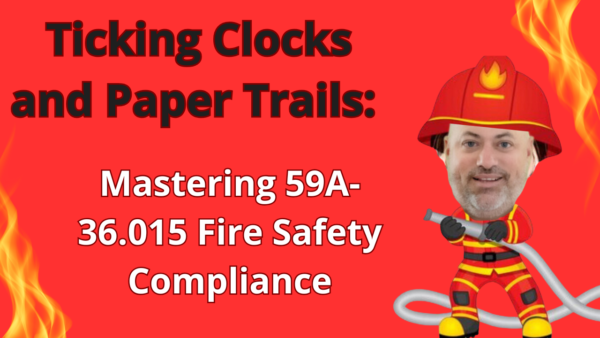Ticking Clocks and Paper Trails: Mastering 59A-36.015 Fire Safety Compliance
Operating an assisted living facility requires careful adherence to regulations that ensure the safety and well-being of residents and staff. One critical aspect of compliance is maintaining up-to-date fire safety inspection reports as mandated by 59A-36.015 (1)(k) of Florida Administrative Code. This regulation specifies that facilities must keep fire safety inspection reports issued by the local authority or the State Fire Marshal for the past two years. Here’s what you need to know to stay compliant and proactive.
The Importance of Fire Safety Inspections
Fire safety inspections are more than just a regulatory requirement—they are essential to safeguarding your facility, residents, and staff against potential fire hazards. These inspections ensure your facility meets critical safety standards, such as properly functioning fire alarms, sprinkler systems, and clearly marked evacuation routes.
Florida law, through Section 429.41, F.S., and Rule Chapter 69A-40, F.A.C., mandates these inspections for all licensed assisted living facilities. Keeping accurate and accessible records of these reports is not only vital for compliance during audits but also serves as proof of your commitment to safety.
The Two-Year Paper Trail Requirement
Under 59A-36.015 (1)(k), facilities are required to retain fire safety inspection reports for at least two years. These documents are crucial during licensing surveys and other audits to demonstrate compliance with fire safety standards. Failing to have these records on hand could lead to citations, fines, or even the suspension of your facility’s license.
Maintaining an organized system for these records is essential. Whether you use physical files, digital storage, or a combination of both, your facility must be able to produce these reports on demand.
Challenges with Fire Marshal Inspections
In an ideal world, fire inspections would be scheduled and completed seamlessly. However, it is not uncommon for facilities to face delays due to the fire marshal’s schedule, workload, or administrative oversights. These delays can leave facilities vulnerable, especially if compliance deadlines are approaching or if a licensing survey is imminent.
Facilities that rely solely on the fire marshal’s office to manage these inspections may find themselves in a precarious situation. The key takeaway? Be proactive.
Proactive Steps to Stay Compliant
- Track Inspection Due Dates:
Keep a record of when your last fire safety inspection took place and when the next one is due. Use reminders or scheduling software to stay on top of deadlines. - Contact the Fire Marshal Early:
If your facility hasn’t been inspected recently, don’t wait for the fire marshal to reach out. Proactively contact the local authority or State Fire Marshal’s office to schedule your inspection. Early communication helps you avoid last-minute stress. - Follow Up Persistently:
Fire marshal offices can be busy, and inspections may inadvertently slip through the cracks. If you’ve already scheduled an inspection but haven’t received confirmation or if the scheduled date has passed, follow up. Polite but persistent communication is essential. A simple phone call or email can often expedite the process. - Document All Communications:
Keep a record of your communication with the fire marshal’s office, including emails, phone calls, and appointment confirmations. This documentation can be useful if there are delays or disputes during your licensing process. - Engage a Fire Safety Consultant if Necessary:
If the fire marshal’s office remains unresponsive, consider hiring a fire safety consultant to assess your facility’s compliance. While this does not replace the official inspection, it can help you identify and address potential hazards in the interim.
Why It’s Critical to Push for Inspections
Failure to secure a timely fire inspection can have serious consequences, including citations during state surveys, fines, or even jeopardizing your license. Additionally, a lapse in inspection could leave your facility unprepared in the event of a fire, putting lives at risk.
By taking the initiative to schedule and follow up on inspections, you demonstrate your facility’s commitment to safety and compliance. This proactive approach not only helps you avoid potential regulatory issues but also builds trust with residents and their families.
Key Takeaways for Facility Owners and Administrators
- Maintain all fire safety inspection reports for at least two years, as required by 59A-36.015 (1)(k).
- Proactively schedule inspections with the fire marshal’s office to avoid delays.
- Follow up regularly if inspections are not completed as planned.
- Document all communications and keep your records organized.
- Address potential fire hazards through internal audits or third-party consultants.
Final Thoughts
As an assisted living facility operator, your top priority is the safety and well-being of your residents. Compliance with fire safety regulations, including maintaining a two-year paper trail of inspection reports, is a critical component of this responsibility. By staying proactive and organized, you can avoid unnecessary delays, ensure your facility is inspection-ready, and maintain compliance with Florida’s assisted living regulations.
